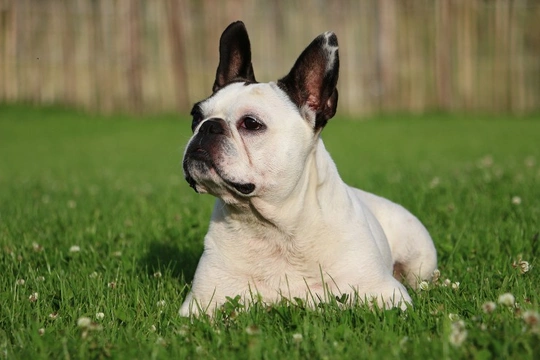
Risk factors for aspiration pneumonia in brachycephalic dogs
Brachycephalic dogs are those that have a flat face and often, protruding eyes, which is a breed-specific trait of a reasonable number of popular favourites including the French bulldog, English bulldog, boxer, and Boston terrier among others.
As well as causing the signature flatter face and obvious visible traits that we associate with such breeds, being brachycephalic also by design means that the construction and conformation of the anatomy of the dog’s face, nasal passage, mouth and eyes are all different to the norm too, which can potentially cause various different problems for the dogs in question.
The greater the degree of exaggeration or flatness of the face, the more likely the dog is to suffer from a range of issues, including conformation problems that may be acute enough to require surgical correction, and a tendency to be more at risk from problems like heatstroke, damage to the eyes, and respiratory problems.
This means that anyone who owns a brachycephalic dog or that may be considering buying one is advised to learn about what being brachycephalic can mean for their dog, and potential problems to watch out for.
One of the less common but more serious conditions that can affect brachycephalic dogs and that poses more of a risk to them than dogs with longer muzzles is aspiration pneumonia, and a range of risk factors for brachycephalic dogs make this condition more common in flat-faced dogs than others.
In this article, we will look at aspiration pneumonia in brachycephalic dogs in more detail, including why brachycephalic dogs have higher risk factors for the condition, what causes it, and what it does. Read on to learn more.
What is aspiration pneumonia?
Pneumonia is a disease that causes inflammation of the lungs, due to irritation of the alveoli, or tiny air sacs that hold the air that we breathe in. The condition can range from mild to severe, with symptoms ranging between a persistent or chronic cough alone, through to high fever, chest pains and an inability to breathe properly. The condition can be caused by a variety of different factors including both viral and bacterial infections, or due to inhaling something into the lungs that the dog cannot efficiently cough back up again.
This last cause, inhalation of a foreign body, is what we call aspiration pneumonia, and this is the type of pneumonia that poses a particular risk to brachycephalic dogs. The foreign body in question can be more or less anything, including small parts of a toy that your dog has chewed up or something similar; but it is more likely to consist of food, vomit, or even water.
Why are brachycephalic dogs more at risk than others?
Any dog can theoretically develop aspiration pneumonia, but brachycephalic dogs-and particularly those with very exaggerated or flat features-are more at risk than others, for a variety of reasons.
Aspiration pneumonia in brachycephalic dogs often develops as a side-effect of another condition caused by their flat faces-particularly, conditions that are apt to lead to vomiting, difficulty swallowing, or other problems that may increase the chances of something being inhaled accidentally rather than swallowed.
Dogs with soft palate problems-another common problem of brachycephalic breeds-as well as problems such as cleft palate, oesophageal reflux, larynx malformations and muscular conditions such as polymyopathy, all increase the risks of aspiration pneumonia developing.
Across the canine population as a whole, a wide range of risk factors can lead to the condition, including seizure disorders that can lead to the inhalation of vomit or saliva, head injuries, and anything that affects the dog’s ability to swallow and eat normally.
What are the symptoms of aspiration pneumonia in dogs?
If you own a brachycephalic dog, particularly one with very exaggerated features, it is important to be aware of the problems that this can cause and ask your vet to examine your dog’s conformation and advise you on any specific challenges that they might face, as well as the more general ones.
The main risk for brachycephalic dogs when it comes to aspiration pneumonia is inhalation of something into their lungs-this is commonly either vomit or food particles, and it is important to note that the condition may not become apparent at the time of ingestion, and can take a while to develop.
Once aspiration pneumonia has developed, some of the symptoms that you may observe are as follows:
- Lots of coughing, or attempting to cough. This may be either a dry or a productive cough.
- Rapid, shallow or laboured breathing, potentially with accompanying sounds.
- Pale mucous membranes.
- Lack of tolerance for exercise.
- Fever and potentially, increased heart rate.
- Loss of interest in food and treats.
- A runny or snotty nose.
- The dog will, in general, seem out of sorts and unwell, potentially showing signs of pain or distress.
If you spot any of these symptoms in your brachycephalic dog, contact your vet immediately as aspiration pneumonia is a serious condition that requires veterinary intervention. Your vet will ask you to take your dog along to the clinic, where they will work to diagnose or rule out aspiration pneumonia using methods including a physical examination, X-rays and potentially, blood tests and other investigative procedures.
Can the condition be treated?
In order to give your dog the best chances of recovering from aspiration pneumonia, prompt intervention is vital. Care will usually be undertaken in the clinic for a few days until your dog begins to stabilise and improve, and may involve minimal physical activity, oxygen therapy, and the use of bronchodilators to make it easier for your dog to breathe. Large or hard foreign bodies in the lungs may require surgical removal.
If your dog’s conformation was a contributing factor to the condition and this is something that can be corrected, your vet may also advise surgery to reduce the chances of a recurrence of the condition after your dog has recovered.



